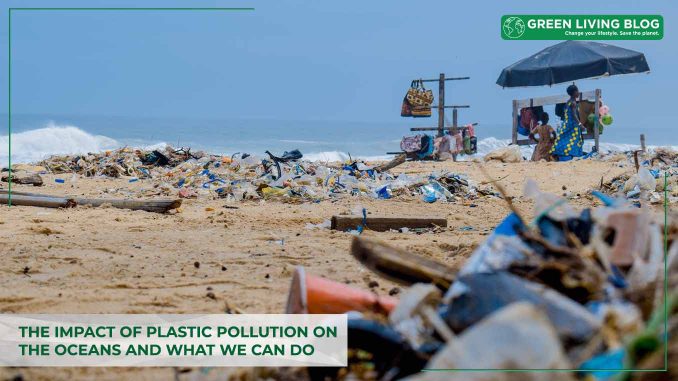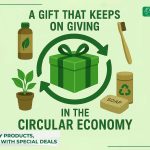
Plastic pollution is a global environmental crisis that poses a significant threat to our oceans. The detrimental effects of plastic waste on marine life, ecosystems, and human health are alarming.
In this article, we will delve into the profound consequences of plastic pollution on the oceans and explore actionable steps that individuals can take to address this critical issue.
The Scale of the Problem
The oceans, once perceived as vast and limitless, are now inundated with plastic debris. From single-use plastics to abandoned fishing gear, the marine environment is suffocating under the weight of human-made waste. Millions of tons of plastic enter the oceans annually, posing a severe threat to aquatic life.
Impact on Marine Life

One of the most distressing aspects of plastic pollution is its impact on marine life. Sea creatures often mistake plastic for food, leading to ingestion and entanglement. This not only causes injury and death to marine animals but also introduces harmful chemicals into the food chain, affecting species across different levels.
Ecosystem Disruption
The presence of plastic in the oceans disrupts ecosystems and biodiversity. Coral reefs, vital for marine life, are particularly vulnerable. Plastic pollution hampers the growth of corals, weakens their resilience to disease, and damages the delicate balance of these underwater ecosystems.
Human Health Concerns
The consequences of plastic pollution extend beyond marine life. Microplastics, tiny particles resulting from the breakdown of larger plastic items, have found their way into the human food chain. This raises concerns about the potential health risks associated with the consumption of contaminated seafood and the ingestion of microplastics in drinking water.
What we can do to reduce Plastic Pollution in Oceans

The battle against plastic pollution requires collective action. Individuals can make a significant impact by adopting the following practices:
Reducing single-use plastics and embracing reusable alternatives for items like bags, bottles, and containers is a key factor in minimizing single-use plastic consumption.
Tips for Reducing Single-Use Plastics
1. Reusable Bags
Invest in reusable shopping bags made from sustainable materials like cotton or jute. Keep these bags handy for grocery shopping, eliminating the need for plastic bags.
2. Reusable Water Bottles
Carry a reusable water bottle to avoid purchasing bottled water. Stainless steel or glass bottles are durable alternatives that help cut down on the use of disposable plastic bottles.
3. Bring Your Own Container
When ordering takeout or bringing home leftovers from a restaurant, consider bringing your own reusable container. This practice reduces the need for single-use plastic containers.
4. Say No to Straws
Skip the straw when ordering beverages. If using a straw is a must, consider bringing your own reusable straw made from materials like stainless steel, bamboo, or silicone.
5. Choose Products with Minimal Packaging
Opt for products with minimal or eco-friendly packaging. Look for items with packaging that can be easily recycled or repurposed. We are now seeing biodegradable bags made out of cotton and hemp, and other materials come on the market
6. Be Mindful of Food Packaging
When grocery shopping, choose products with minimal plastic packaging. Buying in bulk can also help reduce overall packaging waste.
Benefits of Embracing Reusable Alternatives

1. Environmental Impact
The primary benefit of reducing single-use plastics is a positive impact on the environment. Fewer disposable plastics mean less plastic waste entering landfills and oceans, reducing the overall ecological footprint.
2. Cost Savings
While there may be an initial investment in purchasing reusable items, the long-term cost savings are significant. Reusable products often prove more cost-effective over time compared to constantly buying disposable alternatives.
3. Contribution to a Sustainable Lifestyle
Embracing reusable alternatives aligns with a sustainable and eco-friendly lifestyle. It reflects a commitment to making choices that prioritize the health of the planet and future generations.
4. Inspiring Change
When individuals adopt reusable practices, they contribute to a larger cultural shift away from a throwaway mentality. This collective change in behaviour can inspire others and create a ripple effect towards a more sustainable society.
Fun Reusable Plastics Fact
The world’s largest reusable shopping bag was created in 2009 in the United States. This colossal bag, aptly named the “Mother Bag,” measured a whopping 39 feet (11.8 meters) in height and 79 feet (24 meters) in width when fully expanded. It was designed as part of an awareness campaign to promote the use of reusable bags and to emphasize the environmental benefits of reducing single-use plastic. The Mother Bag certainly made a statement about the importance of embracing reusable alternatives in a larger-than-life way!
What Else Can We Do

1. Proper Waste Disposal
Dispose of plastic waste responsibly by recycling and ensuring it doesn’t end up in water bodies. Participate in community clean-up initiatives to remove existing plastic pollution.
2. Support Legislation and Advocacy
Advocate for stricter regulations on plastic production and disposal. Support organizations working towards sustainable waste management and reduction.
3. Choose Sustainable Products
Opt for products with minimal or eco-friendly packaging. Support businesses that prioritize sustainable and plastic-free practices.
4. Educate and Raise Awareness
Spread awareness about the consequences of plastic pollution and inspire others to adopt sustainable practices. Education is key in driving behavioural change.
Closing Thoughts
Plastic pollution in our oceans is a complex and urgent issue that demands immediate attention. By understanding the gravity of the problem and taking actionable steps in our daily lives, we can contribute to the preservation of our oceans and the well-being of future generations. The time to act is now, and our collective efforts can make a significant difference in restoring the health and vitality of our marine ecosystems.
Single-use plastics contribute significantly to the pollution of our oceans. These disposable items, designed for convenience, often have a long-lasting negative impact on the environment. By making a conscious effort to reduce our reliance on single-use plastics, we can make a meaningful difference in mitigating plastic pollution.
![]()
Author Profile
- Online Media & PR Strategist
- Blogger and Educator by Passion | Senior Online Media & PR Strategist at ClickDo Ltd. | Fascinated to Write Lifestyle Blogs in News & Education I have completed a journalism summer course at the London School of Journalism and manage various blogs.
Latest entries
 Green GuidesMay 29, 202519 Best Eco-Friendly Products, Services & Gifts – With Special Deals
Green GuidesMay 29, 202519 Best Eco-Friendly Products, Services & Gifts – With Special Deals List postMay 28, 202510 Everyday Items with PFAs (‘Forever Chemicals’) and Green Alternatives
List postMay 28, 202510 Everyday Items with PFAs (‘Forever Chemicals’) and Green Alternatives List postMay 22, 20258 Eco-Friendly & Energy-Saving Home Gadgets for Daily Routines
List postMay 22, 20258 Eco-Friendly & Energy-Saving Home Gadgets for Daily Routines Green LivingMay 15, 20258 Healthy BBQ Swaps for a Cleaner, Greener, Guilt-free Grillfest
Green LivingMay 15, 20258 Healthy BBQ Swaps for a Cleaner, Greener, Guilt-free Grillfest






Leave a Reply
You must be logged in to post a comment.